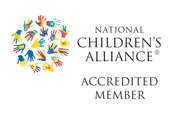Why You Need to Have the Conversation: Children are No Match for Predators
February 22, 2022
We would prefer to think that perpetrators of child sexual abuse are easily spotted on the edges of society, people who stand out or seem uncomfortable; people we don’t know. We tell our children to not talk to strangers and remind them that if you don’t know someone in real life or online, not to share any personal information. And while these lessons are important to teach, the truth is that perpetrators of child sexual abuse are rarely the man with the van in the trench coat. In fact, they look “normal.” Studies show that 90% of victims know their abusers – they are family, close friends, teachers, daycare staff, coaches, and members of the faith community. Simply put, abusers are most often those we trust our children with on a daily basis.
Four years ago, Larry Nasser made headlines. He was a nationally known doctor for the United States women’s Olympic gymnastics team, while at the same time a serial child rapist who used his position of power and trust to sexually abuse and assault hundreds of girls and young women. Through social media and the news, millions of Americans heard from dozens of his victims and the trauma it made in their lives. Last year we discussed the more than 92,000 sexual abuse claims made against the Boy Scouts of America, and the Diocese of Fall River of the Catholic Church releasing the names and assignments of 75 clergy members accused of child sexual abuse going back 70 years. We’ve seen in recent years the harm caused by allegations of sexual abuse and inappropriate conduct of teachers in our own community.
On February 10, 2022, a child psychologist in Danvers, Massachusetts was arrested after a contractor stumbled upon a secret space in the building he resided where he allegedly kept hundreds of images of child sexual abuse material. As a part of the initial investigation, there appears to be considerable evidence of his involvement in the ownership of the material. While the presumption of innocence exists until someone is proven guilty, it is so disturbing that a child psychologist would own child pornography.
It is not the outcasts of society who are abusing children, it is those with the most trust, power, status, or celebrity.
What all these cases highlight is that it is those with the most trust, power, status, or celebrity who abuse children. Perpetrators groom not only children, but the environment, parents and caregivers, neighbors, and coworkers around them. The manipulation of the predator is often why, after an initial accusation, many will respond with disbelief, and shock, even fight to defend the abuser because, if true, the deception is incredibly hurtful and horrific.
Perpetrators of abuse are cunning, smart, patient, and watch carefully and quietly; they look for vulnerable children. Vulnerability is more than just age, size, and gender identity; it’s looking to see if a child’s parents are always working, is the child getting enough attention, does a child have a disability, feel like an outcast, or do they have overly trusting parents? These are examples of what predators look for and what they consider an easy opportunity.
In recorded interviews, perpetrators of abuse discussed very openly with Oprah Winfrey how they gained trust and took advantage of children (this video is very detailed, and disturbing, please be advised). Individuals who abuse children think differently than those who don’t. Very often, they do not believe what they are doing is wrong to the child, but that it is simply shunned by society. Corey Jewell Jensen, M.S, who has worked with sex offenders for more than 35 years, details the way in which perpetrators of abuse groom the environment, parents and children of those victimized and justify their behavior.
Unfortunately, when faced with the reality of the cunning grooming practices of predators, we need to acknowledge that young children are no match for those who seek to sexually abuse a child. This is why at Children’s Cove, we often advocate that parents “Have the Conversation.” There’s no perfect time or age to speak with your children about body safety. Instead, it should be part of regular, ongoing conversation from a child’s early years through their teens.
We talk with our children about so many important safety topics, including fire, water, street, and car safety. Let body safety be another topic you introduce. To learn more about how to have the conversation about body safety visit our page here.






